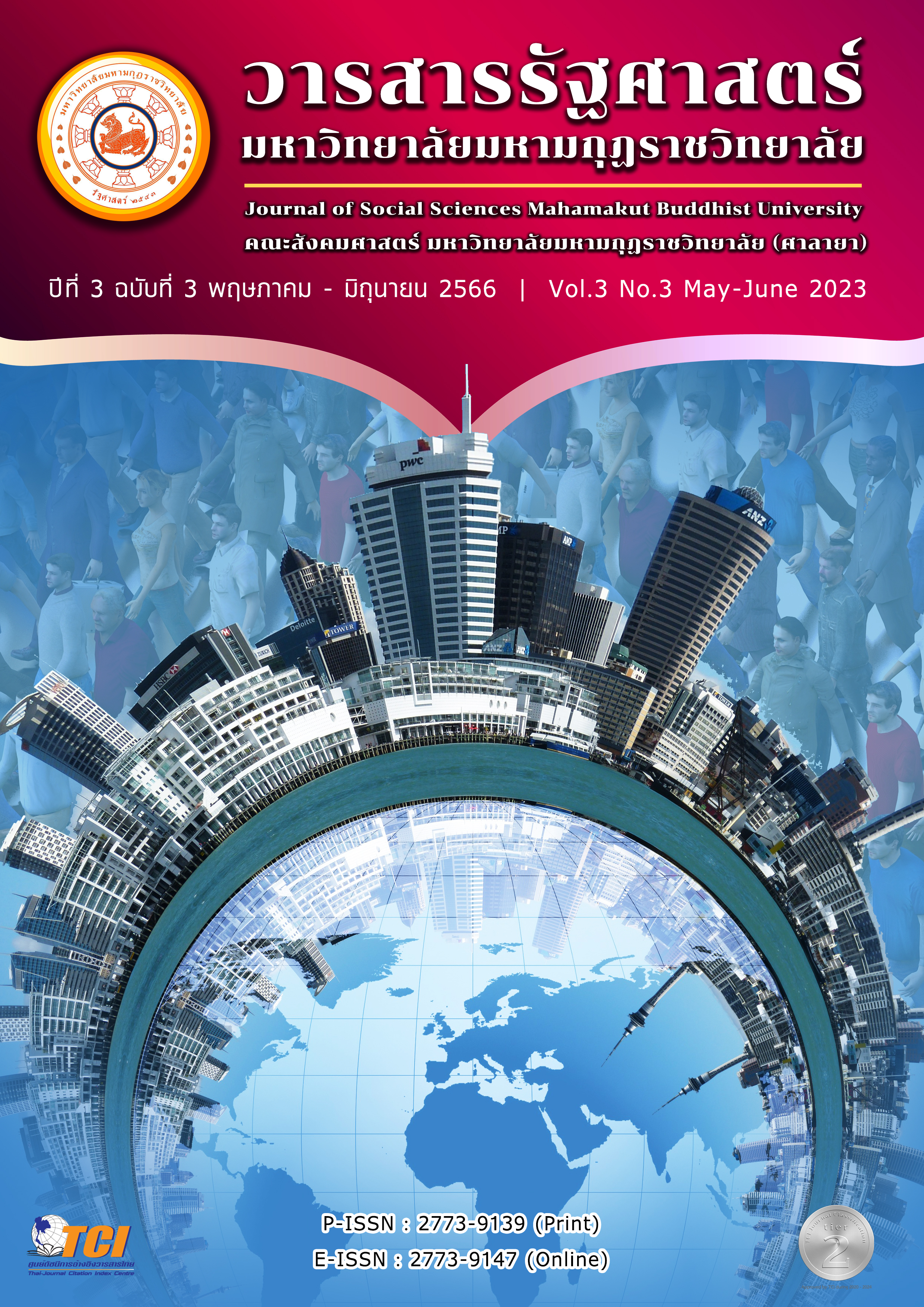THE STUDY OF DIGITAL INTELLIGENCE QUOTIENT OF UNDERGRADUATE STUDENTS IN THE 21ST CENTURY AT MAHAMAKUT BUDDHIST UNIVERSITY, MAHAVAJIRALONGKORN RAJAVIDYALAYA CAMPUS
Main Article Content
Abstract
The objectives of this research were 1) to study the digital intelligence quotient of undergraduate students in the 21st century, 2) to compare the digital intelligence quotient of undergraduate students in the 21st century was classified by sex, grade level and faculties and 3) to study ways to develop the digital intelligence quotient of undergraduate students in the 21st century. The population consisted of 1st-4th year undergraduate students, regular semester, 3 courses consisting of Bachelor of Political Science Program, Bachelor of Education Program and the Bachelor of Arts program in the second semester of academic year 2021 in the amount of 104 person by using purposive sampling and in-depth interviews with 5 experts with using purposive sampling. The research tools were an interview form and a digital intelligence test had a confidence level of 0.990. The statistics used in data analysis were Frequency, Percentage, Mean and Standard Deviation, t-test Independent, F-test and One-Way Analysis of Variance : ANOVA.
The results of research were concluded as follows : 1. The digital intelligence quotient of undergraduate students in the 21st century, Overall, it was at a high level with a very average level. When considering each side, it was found that all aspects were at a high level in descending order as follows : digital literacy, digital security, digital rights, digital identity, digital emotional Intelligence, digital communication, digital safety and digital use. 2. Comparison of digital intelligence quotient of undergraduate students in the 21st century classified by sex, grade level and faculties were not different which was inconsistent with the hypothesis and 3. The digital Intelligence quotient development guidelines of undergraduate students in the 21st century should develop students to knowledgeable, capable of perceiving as well as intellectual abilities, emotions and society that were necessary to live in the digital age in order to face challenges and adapt to the modern society in the digital age appropriately, for example, having to know how to use technology, know technology tools and have a working understanding, In other words, the ability to use tools to work for maximum efficiency and have discretion in the use of technology.
Article Details

This work is licensed under a Creative Commons Attribution-NonCommercial-NoDerivatives 4.0 International License.
References
กรมกิจการเด็กและเยาวชน. (2563). รายงานสถานการณ์ด้านเด็กและเยาวชน. กรุงเทพมหานคร: กระทรวงการพัฒนาสังคมและความมั่นคงของมนุษย์.
ฉัตรพงศ์ ชูแสงนิล. (2561). ยุคแห่งพลเมืองดิจิทัล. เรียกใช้เมื่อ 19 ธันวาคม 2565 จาก https://www.scimath.org/article-technology/item/8659-2018-09-11-07-58-08.
ธนวัฒน์ เจริญษา และสุภาณี เส็งศรี. (2563). ความฉลาดทางดิจิทัลกับทักษะการเรียนรู้และนวัตกรรมในศตวรรษที่ 21. วารสารวิจัยและนวัตกรรม สถาบันการอาชีวศึกษากรุงเทพมหานคร, 3(2), 21-29.
นิตยา นาคอินทร์ และคณะ. (2564). 8 ทักษะ “ความฉลาดทางดิจิทัล” ของนักศึกษาวิชาชีพครูสู่การเป็นพลเมือง 4.0. วารสารบัณฑิตศึกษา มหาวิทยาลัยราชภัฏเชียงราย, 14 (1), 1-11.
แบรนด์บุฟเฟ่ต์ ทีม. (2557). รู้ลึก รู้จริง Digital Natives บริโภคสายพันธุ์ใหม่ นักการตลาดต้องรู้ !!. `เรียกใช้เมื่อ 19 ธันวาคม 2565 จากhttp://www.brandbuffet.in.th/2014/03/ digital-natives-mindshare-research/.
ปณิตา วรรณพิรุณ และนำโชค วัฒนานัณ. (2560). ความฉลาดทางดิจิทัล (Digital Intelligence). วารสารพัฒนาเทคนิคศึกษา, 29(102), 12-20.
พีรวิชญ์ คำเจริญ และวีรพงษ์ พลนิกรกิจ. (2561). เด็กกับการรู้เท่าทันดิจิทัล. วารสารวิชาการนวัตกรรมสื่อสารสังคม, 6(2), 22-31.
วิทยา ดำรงเกียรติศักดิ์. (2558). พลเมืองดิจิทัล. เชียงใหม่: คณะสารสนเทศและการสื่อสาร มหาวิทยาลัยแม่โจ้.
วรวัฒน์ เชิญสวัสดิ์ และโกมล นารัง. (2558). การตรวจจับโค้ดที่เป็นอันตรายบนระบบปฏิบัติการแอนดรอยด์ด้วยการวิเคราะห์สายอักษร. วารสารวิทยาการและเทคโนโลยีสารสนเทศ, 5(2), 25-33.
วรรณากร พรประเสริฐ. (2562). การพัฒนาแบบวัดและเกณฑ์ปกติความเป็นพลเมืองดิจิทัลของนิสิตนักศึกษาในสถาบันอุดมศึกษา. ใน วิทยานิพนธ์การศึกษาดุษฎีบัณฑิต สาขาวิจัยและประเมินผลการศึกษา. มหาวิทยาลัยนเรศวร.
วลัญชพร ทุ่งสงค์ และลักขณา สริวัฒน์. (2562). การศึกษาความฉลาดทางดิจิทัลในระดับความเป็นพลเมืองดิจิทัลของนักเรียนชั้นมัธยมศึกษาตอนต้น โรงเรียนสารคามพิทยาคม อำเภอเมือง จังหวัดมหาสารคาม. วารสารการบริหารและนิเทศการศึกษา มหาวิทยาลัยมหาสารคาม, 10(3), 19-34.
อริสรา พิสิฐโสธานนท์ (2549). คู่มือความปลอดภัยอินเทอร์เน็ต. กรุงเทพมหานคร: ภาพพิมพ์.
Park, Yuhyun. (2016). 8 digital skills we must teach our children. Retrieved January 30, 2021, Available from https://www.weforum.org/agenda/2016/06/8-digital-skills-we-must- teach-our-children/ [Cited June 9, 2021].


